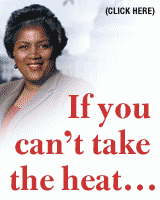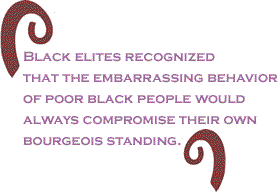
|
|||||||||||||||||||||
|
|
This article originally appeared in Africana.com. The old maxim warns us to beware of priests who lose their faith but keep their jobs. By that logic, a whole lot of alleged spokespersons for black people should've been unemployed a long time ago. In the wake of Bill Cosby's now-famous Pound Cake Speech at the NAACP Legal Defense Fund's dinner commemorating the Brown v. Board of Education case, the comedian has been praised by white conservatives and black folk at large for essentially keeping it real. For airing dirty laundry. For saying in public what your uncle Bobby has been saying behind closed doors for years. But hold on. Before you fix your mouth to sing Cosby's praises, consider this: the fact that some black people make similar comments in private does not make them any more accurate when they are spoken in public. When it all gets down to the get-down, black people are no more immune to believing stereotypes about African Americans than anyone else – and Cosby's podium-pounding was full of the grossest stereotypes of poor black people. Even if you agreed with his hyperbolic claims of $500 sneakers taking precedence over Hooked on Phonics in the hood, even if you signed on to his 21st Century bootstrap prescriptions ("You can't blame white people for this"), it's impossible to ignore the classist, bigoted and reactionary underpinnings of his disdain for giving black children names like Shaniqua or Ali, or his justification of police shooting people in the back of the head for "stealing pound cake." (I have to wonder what Cosby would say to me, a black man with a Ph.D. and no criminal record, who has, nonetheless, had police pull guns on him three times in his life – once by an officer demanding that I walk on the sidewalk and not the street.) In the wake of Amadou Diallo and Abner Louima, in the wake of literally dozens of black people being arrested and imprisoned on false evidence in Tulia, Texas, two years ago, these comments are not only ignorant, but also extremely dangerous.
Amid all the national clatter
that Cosby's comments have generated, it would be easy to miss
the fact that
there is nothing particularly new about his indictments – his
prescriptions fit into a century-old program of bourgeois behavior
modification directed at poor black people from their purportedly
better-off kinfolk. The historian Evelyn Brooks And though the two clashed bitterly on matters of personality and policy, both Booker T. Washington and Du Bois found common ground in advocating moral uplift among the Negro masses. Du Bois lamented in the pages of his masterful Philadelphia Negro that moral corruption and vice were the major afflictions among the newly arrived Southern migrants. Booker T. Washington famously urged his followers to become models of thriftiness, cleanliness and religious adherence, believing this would clear the way to racial uplift. During the same era, Elijah Montgomery, the founder of the all-black town of Mound Bayou, Mississippi, banned the sale of liquor in the area and conducted house-to-house investigations of the domestic arrangements of residents, ordering all couples who were not legally married to leave the district.
In the early 20th century, organizations like the National Association of Colored Women and the Women's Convention of the National Baptist Convention, keenly aware of the prevailing stereotypes of black female sexuality, advocated a program of abstinence and "virtue" as a means of defending their own collective honor. A nearly obsessive concern with personal behavior ties together movements as diverse as Garveyism, the Montgomery Bus Boycott (whose leadership quietly jettisoned the case of a black teen who had been arrested for refusing to give up her seat months before Rosa Parks when the young woman later became pregnant while unmarried), the Nation of Islam and the activities of the National Urban League. (Urban Leaguers met newly arrived migrants with care packages that included soap, toothbrushes and lists of life "instructions" — which included warnings not to come outside with rollers in their hair or keep livestock in their yards.) Taken on its face, a "morality" agenda – however
that is defined – may have been useful; unplanned pregnancy and
crime did negatively impact black people's lives. The
problem, however, lies in the theory that this "morality" would
somehow This respectability politic also ties together Cosby's entire career, from his days playing a Rhodes Scholar on I-Spy to his role as the successful obstetrician Heathcliff Huxtable on The Cosby Show and his noted criticism of Eddie Murphy for his use of profanity and sexual subject matter. In a society built upon one-dimensional, pathological views of black life Cosby's body of work – and his support for historically black colleges – is commendable. But positive imagery and philanthropic good deeds don't justify what is essentially hate speech.
Truth told, reactionary, elitist, stereotypical and inappropriate as they were, there was really nothing black-specific in Cosby's comments. Every ethnic group in this country has experienced this dynamic of intra-group embarrassment. (I have long believed that the NAACP should give Jerry Springer an image award for pulling back the sheets on white American dysfunctionality.) And rich people have been declaring poor people immoral since the days of feudalism; the irony is that we've only recently generated black people who were rich enough to be taken seriously. Ultimately, Cosby was right: we can't solely blame white people for this contempt for the black poor. There are plenty of black people who are responsible too. But most of them are not named Shaniqua. William Jelani Cobb is an assistant professor of history at Spelman College and editor of The Essential Harold Cruse. He can be reached at [email protected]. Visit his website at www.jelanicobb.com |
June
10 2004 |
|||||||||
|
|||||||||
|
|
|||||||||
| Printer Friendly Version | |||||||||
 |
|||||||||
| |
|||||||||
| |
|||||||||




























